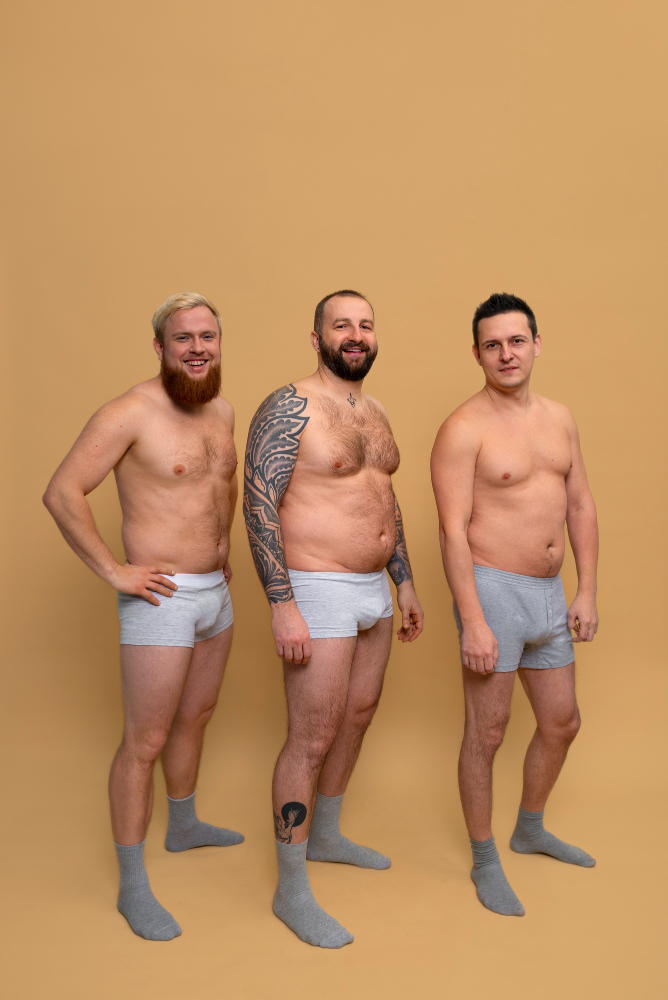
What does it mean to have a ‘Dad Bod’ anymore?
Dad Bod?
Over the last year, many guys have found themselves gaining weight due to the impact that life in lockdown has had on their diet and physical activity. When you can’t leave the house, you’re more likely to spend more hours sedentary, enjoying the creature comforts of the couch and your favorite snacks in front of the TV, just like your old man. Which means that once again, discussions of “dad bod” have proliferated online.
What Is a Dad Bod?
The phrase “dad bod” refers to an average guy who doesn’t have a lean, shredded physique. He might instead have a paunch or visible beer belly, without being hugely overweight—just like the stereotypical suburban father of a nuclear family. And while plenty of language surrounding differing body types—especially those considered less conventionally desirable, like “skinny fat” before it—can be laden with judgment or derision, “dad bod” originated as be a term of endearment. It evokes a relatable, warm kind of dude who kicks back with a beer and pizza after his kids have gone to bed (although it should be mentioned that a dad bod is not exclusive to men who are actually fathers).
Mackenzie Pearson, then a student at Clemson University, was one of the first people to use the term online, in her 2015 article ‘Why Girls Love the Dad Bod.’ Pearson did not coin the phrase—she describes in the story how the term had come to her attention through a handful of friends who happened to be into guys who had a tummy instead of a six-pack—but her piece, which went viral, certainly helped to popularize it.
Plenty of men at the time responded warmly to the notion of the dad bod, feeling it to be a largely positive descriptor for their body type at a cultural moment when the swole male physique was experiencing an ascent in media, propelled by the rippling muscles of actors like the Chrises Hemsworth and Evans.
But in the half-decade since we first heard those two words, they have been used so frequently, and in so many contexts, that their definition has evolved, with some people applying highly restrictive caveats and conditions.
“The dad bod is about being fit enough, just not narcissistically ‘it’s all about me’ uber-fit,” wrote The Guardian‘s Barbara Ellen in 2020. “It’s about having minor love handles, not letting yourself go. When women talk about dad bods, they really mean ‘Hollywood-casual dad bod’: the likes of Matt Damon, father of four, photographed ambling around, looking relatively normal.”
By this logic, you only have a dad bod if you are fit, but not too fit; if you have some fat, but not too much. Think of the category as a fifth option left just off the edges of our “Cut, Ripped, Jacked, or Swole” continuum. Who decides this isn’t clear. Nor is the answer as to whether or not it should be hailed as progress that the male body is now being subjected to a gaze almost as hyper-critical as that which has plagued women for centuries.
When Jason Momoa, one of Hollywood’s fittest working actors, was photographed on vacation in 2019 taking some time off his strict Aquaman training and diet regime, he was accused of having a “dad bod” despite still being in peak condition, albeit with slightly less definition than when training every day on the set of a movie. More recently, after the internet went wild for Zac Efron’s “dad bod” physique last year, Men’s Health clarified in its coverage that “he still looks very fit by just about any normal person’s standards,” and that usage of the term was inaccurate in this instance. Apparently, at some point, people started saying “dad bod” when they simply mean “hydrated.”
The blurring of definitions means that unfortunately, what began as a fairly inclusive, body-positive term for a certain type of guy is now being increasingly used either to fat-shame, or to self-flagellate. You don’t need to spend too long scrolling through Instagram to find posts where the fittest, leanest, most shredded individual might describe themselves as having a “dad bod” if they happened to skip a workout or eat bread one day.
Naturally, some chubbier guys have expressed annoyance when this happens; thin, fit bodies are already centered and rewarded in media, without one of the few positive physical descriptors for fat people being appropriated by these guys too. (The slang term “thicc” is frequently misaligned in similar fashion.)
It’s likely that this trend started out as an exercise in irony. But what’s worrying is how, in true internet fashion, the way a word is used can end up warping how it is interpreted, and subsequently, how a person perceives their own body or the bodies of others. The relationship between social media and body image is already so fraught: what damage might it do to somebody already struggling with self-confidence if they see a swole fitness influencer complaining about their own “dad bod”?
While everyone’s relationship with their own body and their approach to fitness is personal and unique, the same can’t necessarily be said of language. Words have meanings, and those meanings matter.
How Do You Lose a Dad Bod?
The short answer is, you don’t have to.
If you want to lose some weight or work on your fitness because it’s something that will make you feel happier or healthier, go ahead. Some characteristics of the dad bod, namely belly fat, could potentially lead to risks down the line, so taking the initiative to get more active to improve your quality of life wouldn’t be a bad move.
But weight and body composition are not the only indicators of health. If you like the way you look, and enjoy the dadness of your bod, then you keep on doing you.

Recent Comments